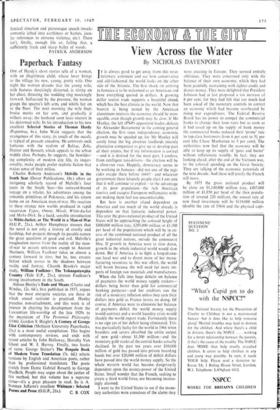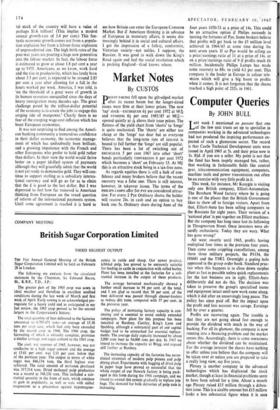View Across the Water
farcical situation and picturesque speech (mock- c-D lar references to extreme violence, etc.). There Trim 1100Kroff 8 E
By NICHOLAS DAVENPORT
Ir is always good to get away from this revo- lutionary continent and see how conservative and old-fashioned the world looks on the other side of the Atlantic. The first shock on arriving in Jamaica is to be welcomed as an American and have everything quoted in dollars. A growing dollar tourist trade supports a beautiful island, which has the best climate in the world. Now that bauxite is being mined by the American aluminium interests the economy should be man- ageable, even though growth may be slow. If Mr Manley, the left (PNP) opposition leader, defeats Sir Alexander Bustamente in the coming general election, the first since independence, economic growth may be speeded up, for Mr Manley will surely force the big absentee landlords (mainly plantation companies) to give up or develop part of their estates, but if my information is correct —and it is derived for the most part, I confess, from intelligent taxi-drivers—the election will be a close-run race. Happily, democracy seems to be working in Jamaica—did not one of the regi- cides escape there before 1660?—and whatever government these leisurely people elect I am sure that it will continue to exploit—to the advantage of its poor population—the rich American tourists and escapist European millionaires with- out making them feel too uncomfortable.
But here is another island dependent on America and too much of the world already is dependent on that fantastic industrial power. This year the gross national product of the United States will be approaching the colossal height of $800,000 million (say, £285,000 million or £1,500 per head of the population) which will be in ex- cess of the combined national product of all the great industrial nations, outside the communist bloc. If growth in America were to slow down, growth in the whole industrial world would slow down. But if America is to fight a long-drawn- out local war and to divert more of her manu- facturing resources to this war effort, the world will boom because she will need far more im- ports of foreign raw materials and manufactures.
When she falls into huge deficits on balance of payments the world money supply rockets— dollars being better than gold for commercial banking purposes—and her creditors run the risk of a monetary inflation unless they turn their dollars into gold as France insists on doing. Of course, if America were to eliminate her balance of payments deficit the world money supply would contract and a world liquidity crisis would shackle the world export trade. Fortunately there is no sign yet of her deficit being eliminated. This was particularly lucky for the world in 1966 when hoarders and savers absorbed the entire output of new gold—about $1,500 million—and the monetary gold stocks of the central banks actually declined. In the past ten years over $10,000 million of gold has passed into private hoarding hands but over $20,000 million of deficit dollars have passed into the world money supply. So the whole western world has become dangerously dependent upon the money-power of the United States. Small wonder that the French, seeking to create a third world force, are becoming increas- ingly alarmed.
I went to the United States to see if the mone- tary authorities were conscious of the alarm they were creating in Europe. They seemed entirely oblivious. They were concerned only with the balance of their own economy, which they had been painfully restraining with tighter credit and dearer money. They were delighted that President Johnson had at last proposed a tax increase of 6 per cent, for they had felt that too much had been asked of the monetary controls to correct an economy which had become overheated by rising war expenditures. The Federal Reserve Board has no power to compel the commercial banks to change their loan rates but as soon as it had cased up on the supply of bank money the commercial banks reduced their 'prime' rate to top-class borrowers from 6 per cent to 54 per cent (the Chase Manhattan to 5 per cent). The authorities now feel that the economy will be able to keep up its supply of 'guns and butter' without inflationary trouble. In fact, they are looking ahead, after the end of the Vietnam war, to the colossal spending on the Great Society. They are talking of the economic potentials of the next decade. And these will terrify the French still more.
By 1975 the gross national product will be close on $1,140,000 million (say, £407,000 million or £1,850 per head of the then popula- tion of around 220 million), the annual rate of new fixed investment will be $118,000 million (double the rate of 1964) and the physical capi- tal stock of the country will have a value of perhaps $1.6 trillion! (This implies a modest annual growth-rate of 3.4 per cent.) This fan- tastic economic growth comes not from a popula- tion explosion but from a labour-force explosion of unprecedented size. The high birth rates of the post-war years are pouring a huge new generation into the labour market. In fact, the labour force is estimated to grow at about 1.8 per cent a year up to 7975. Americans, as we know, work hard and the rise in productivity, which has lately been about 3.3 per cent, is expected to be around 2.85 per cent a year after allowing for a fall in the hours worked per week. America, I was told, is 'on the threshold of a great wave of growth in its human resources unequalled since the days of heavy immigration many decades ago. The great challenge posed by the trillion-dollar potential of the economy is to create the jobs to engage this surging tide of manpower.' Clearly there is no fear of the creeping wage-cost inflation which has beset European economies.
It was not surprising to find among the Ameri- can banking community a tremendous confidence in their dollar economy, the economic manage- ment of which has undoubtedly been brilliant, and a growing impatience with the French and other Europeans who prefer to hold gold rather than dollars. In their view the world would thrive better on a paper (dollar) system of payments although they will gracefully admit that the world is not yet ready to demonetise gold. They will con- tinue to support sterling as a subsidiary interna- tional currency and will go so far as to claim that the £ is good to the last dollar. But I was depressed to feel how far removed is American thinking from European on the vexed question of reform of the international payments system. Until some agreement is reached it is hard to
see how Britain can enter the European Common Market. But if American thinking is in advance of European in monetary affairs, it seems dis- tressingly behind it in social and cultural affairs. I got the impression of a folksy, conformist, Victorian society—not unlike, I suppose, the Russian. It was good to walk down the King's Road again and feel the social revolution which is pushing England—God knows where.



































 Previous page
Previous page